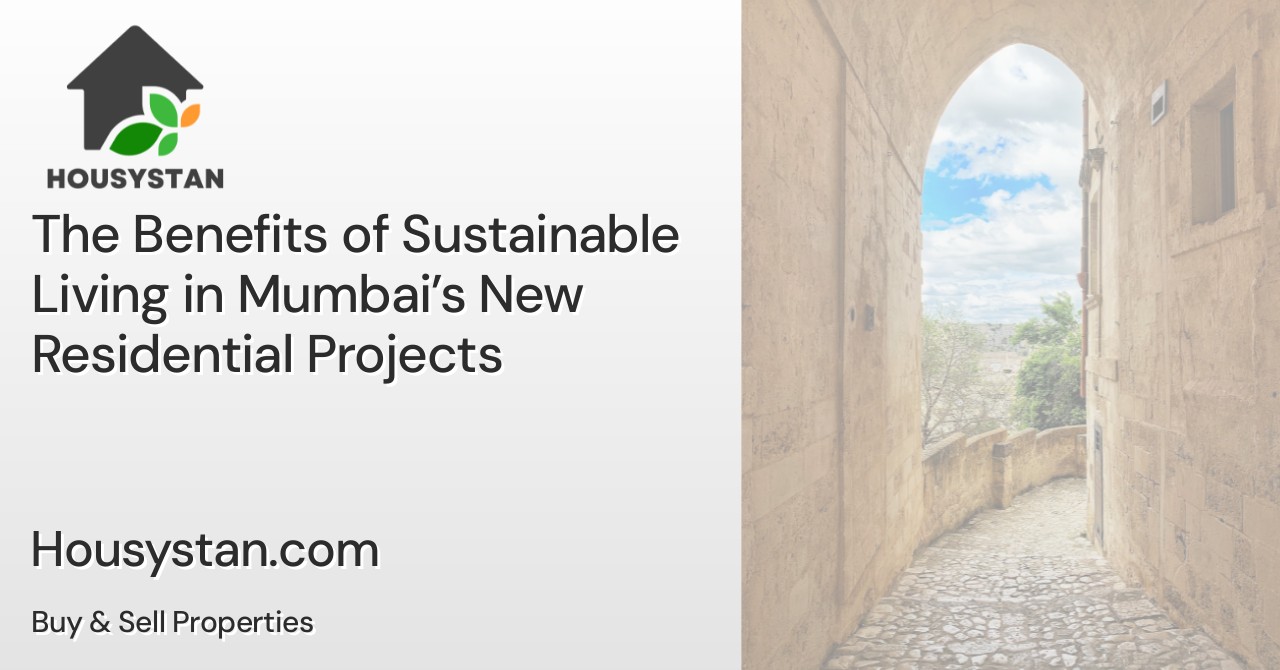The Benefits of Sustainable Living in Mumbai’s New Residential Projects
Read latest blogs and articles from Housystan

The Information mentioned here was last updated on:
21/2/2026The Benefits of Sustainable Living in Mumbai’s New Residential Projects
Introduction: Mumbai’s Evolving Urban Landscape
Mumbai, India’s financial and cultural powerhouse, is undergoing a remarkable transformation as sustainability becomes the cornerstone of its new residential projects. With the city’s population surging and environmental concerns mounting, both developers and homebuyers are increasingly drawn to eco-friendly living spaces. The shift towards sustainable living in Mumbai’s real estate market offers a host of benefits, from reduced carbon footprints to healthier lifestyles and long-term savings. In this article, we delve into the multifaceted advantages of sustainable living in Mumbai’s latest residential developments and explore why this trend is gaining momentum across the city.
- Verified Tenants/Buyers
- Unlimited Property Listing
- Zero subscription/charges fee
The Rise of Sustainable Residential Projects in Mumbai
The urban sprawl of Mumbai has posed significant environmental challenges, including air pollution, water scarcity, and waste management issues. In response, many leading developers are championing sustainable design principles, integrating eco-friendly features and smart technologies into their residential projects. These initiatives are not only addressing environmental concerns but also setting new benchmarks for comfort, convenience, and community living in one of the world’s busiest cities.
Key Features of Sustainable Residential Developments
Modern sustainable residential projects in Mumbai are characterized by a blend of innovative design, green construction materials, and efficient resource management systems. Some of the most common features include:
1. Energy-Efficient Architecture
Builders are increasingly adopting energy-efficient designs that maximize natural light and ventilation, thereby reducing the reliance on artificial lighting and air conditioning. High-performance windows, reflective roofing, and well-insulated walls are standard in these projects, resulting in significant energy savings for residents.
2. Water Conservation Solutions
Rainwater harvesting systems, low-flow fixtures, and water recycling technologies have become integral to sustainable living in Mumbai. These measures help combat the city’s chronic water shortage while lowering utility bills for homeowners.
3. Waste Management Innovations
Onsite waste segregation and composting facilities ensure that organic waste is processed sustainably, minimizing landfill contributions and promoting a cleaner environment. Many residential complexes also collaborate with recycling agencies to manage e-waste and plastics responsibly.
4. Green Spaces and Urban Biodiversity
Landscaped gardens, rooftop terraces, and vertical gardens are now prominent features in new projects. These green spaces not only enhance aesthetic appeal but also improve air quality, support urban biodiversity, and offer residents tranquil environments to unwind.
5. Smart Home Technologies
Automation and IoT-based systems enable residents to monitor and optimize their energy and water usage. Remote control of lighting, climate, and security features enhances convenience while supporting sustainability goals.
Improved Quality of Life for Residents
One of the most compelling benefits of sustainable living is the improvement in residents’ quality of life. Indoor air quality is significantly higher in green buildings, thanks to the use of non-toxic paints, finishes, and air purification systems. Adequate daylight, noise insulation, and natural ventilation contribute to healthier, more comfortable living spaces that promote physical and mental well-being.
Access to well-maintained green spaces and recreational amenities encourages outdoor activities and fosters a sense of community among residents. Sustainable residential projects often include jogging tracks, cycling paths, and play areas, supporting active, healthier lifestyles for all age groups.
Economic Advantages of Sustainable Living
While the initial investment in a sustainable home may be marginally higher, the long-term economic benefits are undeniable. Energy-efficient appliances, solar panels, and water-saving technologies translate to lower monthly utility bills. As the cost of conventional energy and water rises, these savings become even more significant over time.
Additionally, sustainable homes tend to have higher property values and better resale prospects. As awareness of environmental issues grows, more buyers are seeking homes that offer eco-friendly features, ensuring strong demand for such properties in Mumbai’s competitive real estate market.
Environmental Impact: A Step Towards a Greener Mumbai
Adoption of sustainable living practices in residential projects has a direct positive impact on Mumbai’s environment. Reduced energy consumption means lower greenhouse gas emissions, contributing to cleaner air and mitigating climate change. Efficient water management eases the burden on the city’s overtaxed water supply, while waste reduction initiatives curb pollution and protect local ecosystems.
By championing sustainability, residential developers play a crucial role in shaping Mumbai’s future as a greener, more resilient city. These projects serve as inspiration for further eco-friendly initiatives in commercial, retail, and public infrastructure developments.
Government Incentives and Regulatory Support
The Maharashtra government and municipal authorities have introduced a range of incentives to encourage sustainable construction. These include fast-track approvals for green buildings, property tax rebates, and subsidies for renewable energy installations. Such policies are accelerating the adoption of sustainable practices and making green homes more accessible to a broader segment of the population.
Furthermore, regulatory frameworks like the Indian Green Building Council (IGBC) and Global Reporting Initiative (GRIHA) are setting robust standards for sustainable development, ensuring that new residential projects adhere to best practices in environmental stewardship.
Challenges and the Road Ahead
Despite the clear benefits, sustainable living in Mumbai’s residential sector faces certain challenges. High initial costs, limited awareness among buyers, and a shortage of skilled green building professionals can slow progress. However, ongoing education, innovation, and government support are steadily overcoming these obstacles.
As more developers embrace sustainability and consumers recognize the long-term advantages, the momentum for green living in Mumbai is set to grow. Collaboration between stakeholders—developers, residents, policymakers, and environmental organizations—will be key to scaling sustainable solutions citywide.
Conclusion: Embracing Sustainable Living for a Brighter Future
The benefits of sustainable living in Mumbai’s new residential projects are tangible and far-reaching. From enhancing residents’ well-being to delivering economic savings and protecting the environment, the shift towards eco-friendly homes is reshaping the city’s urban landscape. As Mumbai continues to evolve, sustainable residential developments offer a blueprint for responsible growth, ensuring the city remains vibrant, livable, and resilient for generations to come.